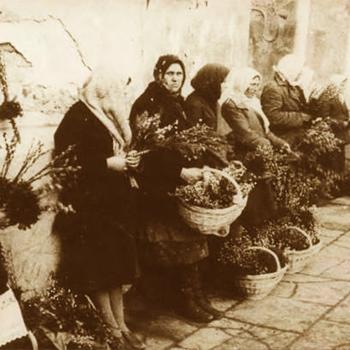On a forum I belong to for Zen teachers there’s a conversation going on about who is a Zen teacher. A worthy question. And not one with an obvious answer. Not that I don’t have opinions.
In fact one of the reasons I like belonging to the American Zen Teachers Association, a loose group that consists of an annual meeting and a listserv and not much more, is that I find I’m among a group of people who have practiced under a Zen teacher for many, many years, and have been authorized within that Dharma lineage as a teacher themselves. But. And this I find the juicy part. Hardly a one of these teachers would have fulfilled the requirements to be made a teacher in any of the other lineages represented.
Some of these teachers come out of communities of practice that emphasize just sitting, others who follow koan curriculums, others who blend these, others who find attention to the technical aspects of liturgy a critical part of practice, others who feel one must, absolutely must spend a significant amount of time in extended retreat. Some priests in the Japanese Bodhisattva lines, other Vinaya monastics, others lay teachers.
The common thread best I can find is two-fold: They all have a formal authorization in a traditional lineage and they all have, whatever other discipline may have been included lots and lots of time in formal meditation, and specifically in meditation retreat. At a minimum a full year of retreat before they were authorized to teach…
And these things are intertwined in a rather powerful way, offering, as I see it corrections to a too hard devotion to one aspect or another.
For instance, and this came out of my contribution to that other conversation, why I think Kapleau Roshi and his heirs are authentically Zen teachers despite the fact they have a compromised lineage in the technical sense, while there are others whom I do not consider to belong to the family despite having no challenge to their formal credentials, at least in the technical sense of a formal authorization.
It is my observation that the technical aspect of a formal and unqualified authorization from a teacher for a student to become a teacher herself, or himself, is very, very important, but, that it is not magic, and there can be extraordinary reasons for accepting someone and their lineage who has not completed this assumed expectation.
I spoke of both vertical and lateral transmission. The vertical is the one we usually speak of, that authorization from a teacher to a student. The lateral is when someone is recognized as a peer by other Zen teachers. In Kapleau’s case, particularly in the case of his heirs, while the vertical is compromised, the lateral is obvious. I know of no one in the American Zen Teachers Association, for instance, who know any of Kapleau Roshi’s heirs who do not see authentic Zen teachers.
The vertical line is a mix of history and myth and we need to be careful about making it into something more than it is. The correction is that horizontal.
Of course we need to be very, very careful about departing from the form of the vertical if we wish to preserve our tradition. In the Kapleau case we have extensive training and a community that preserves the disciplines carefully. And we have special circumstances in a time when transferring was possibly not even possible.
So for me, an easy call: the Kapleau lineage is totally legitimate.
And I can think of several teachers who passed through the West in the nineteen sixties and seventies giving out transmissions for little obvious reason to people who appeared to never study with them. The Japanese Rinzai master Sogen Asahina and the Korean Son master Kyong-bo Seo are two respected teachers who did this. I met one person who had been given the title roshi from a third teacher with whom, the “roshi” acknowledged he’d studied for three months. For perhaps obvious reasons these lineages have not prospered. But there are lines like these that continue to this day.
For the most part I’d say these are not real Zen teachers. And. And this is how this part becomes complicated. I have met people who’ve received such authorizations who by the diligence of their continued practice, and the grace of broken hearts, have become authentic people of Zen.
In my opinion.
I won’t even go into the mess of people who claim lineages but won’t name them, or those who reject the need for lineages. Other than to say there are those, too…
Yes, these days, knowing there’s an ethics code that appears actionable is important.
But, I’m talking about the primary point.
Can this person help you on the way?
Can you reasonably assume this person is competent to guide you?
So.
Who is a Zen Teacher?
I would suggest that if you’re looking for one, you should consider two questions. Can the teacher make a credible claim to stand within a Dharma family? It is worth digging into it a little. Google is a great tool here. And, second, what are they offering? If a regular and sustained practice isn’t part of the package it is hard to call it Zen.
If you got this, and the group seems okay by conventional standards of how groups should act, well, give it a go.
And with that the question turns and becomes who is a Zen practitioner?
A question worth another meditation sometime…













